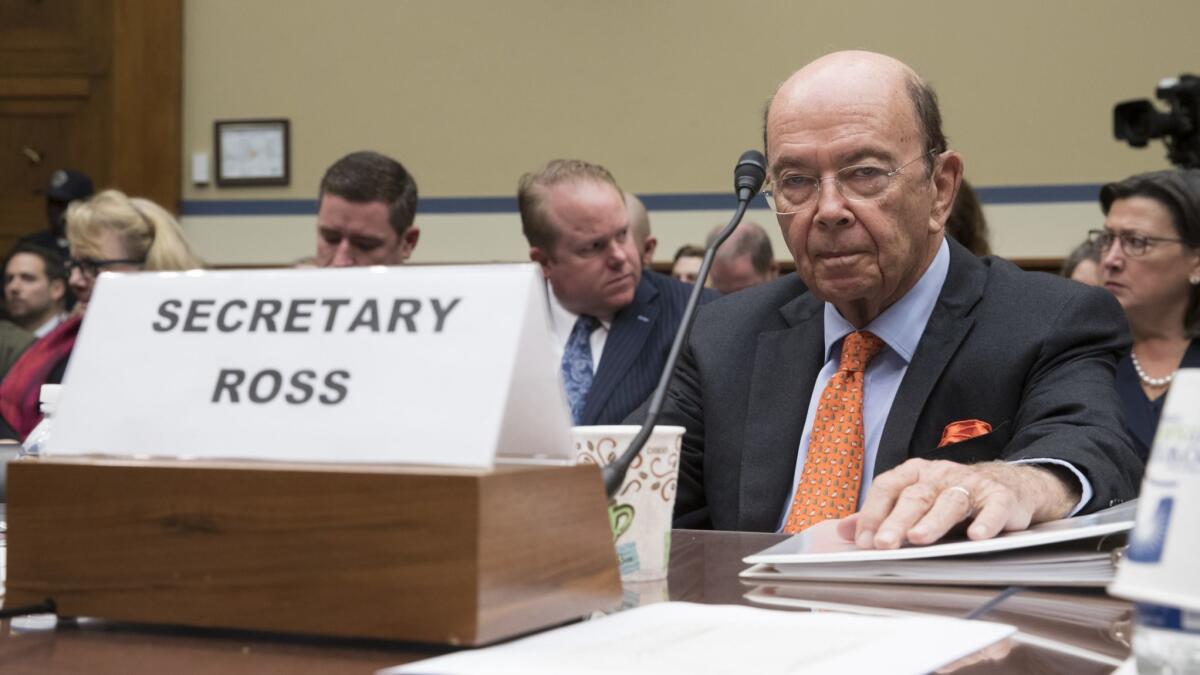Editorial: Asking for citizenship status politicizes the census and imperils an accurate count

When Commerce Secretary Wilbur Ross announced Monday that he was adding a question about citizenship to the 2020 census, he offered this dubious explanation: that the information would somehow make it easier for the Justice Department to root out violations of the Voting Rights Act. But lawyers who have been arguing voting rights cases since the law was adopted in 1965 begged to differ, saying that the government already collects sufficient data to determine where voting rights have been violated.
But here’s what will happen when the question is added: Immigrant communities — and especially people who are living in the United States illegally — will be less likely to cooperate with the census, for fear that any acknowledgment of non-citizenship status will be used against them or their families. It doesn’t take a cynic to see this for what it is: an effort by the Republican administration to reduce the population count in immigrant-heavy communities, which tend to be in Democratic-heavy urban areas.
It doesn’t take a cynic to see this for what it is — an effort by Republicans to reduce the the population count in immigrant-heavy communities.
A lower count, in turn, will lead to less representation of those communities in Congress and less federal aid. That’s why four former census directors who served in both Democratic and Republican administrations filed an amicus brief in a voting rights case three years ago arguing that “because a one-by-one citizenship inquiry would invariably lead to a lower response rate to the census in general, such an inquiry would seriously frustrate the Census Bureau’s ability to conduct the only count the Constitution expressly requires.”
The census, conducted every 10 years, is required by the U.S. Constitution to count every single resident of the country, including non-citizens.
The citizenship question isn’t the only hurdle the nation faces in getting the most accurate census count possible. Critics say the Trump administration and Congress have woefully underfunded the Census Bureau as it prepares for the 2020 count, which will include, for the first time, a website through which people will be able to fill out their questionnaires. Budget constraints led the Census Bureau to cancel two of three test runs of that online system, and critics say the only test being held, beginning April 1 in Providence, Rhode Island, may not be sufficient to find and fix bugs.
A prime reason for that is to reduce staffing costs. The more people who fill out an online form, the fewer people are needed to conduct the paper census. But a planned reduction in the number of temporary workers to be hired for the 2020 count means fewer multilingual census takers to try to track down people in immigrant communities who skip filling out the form, and fewer bodies to travel to remote rural areas.
The Constitution doesn’t specify the questions that must be asked in the census. That’s left to Congress and the president, who have sought information on a range of issues — including, for instance, how many households had radios in 1930.
A citizenship question was first added in the 1890 census, during a period of intense political debate over immigration, and it was removed after the 1950 census. But the question resurfaced in 1970 in the new “long form” questionnaire, which was sent to one in 38 households. The long form was discontinued after the 2000 Census in part because the annual American Community Survey, which began in 1996, asked similar questions with higher utility, since it gave more regular snapshots of the nation’s population.
It’s too late to think that the Trump administration will do the right thing and voluntarily drop the citizenship question. So a dozen states, including California, have filed suit, arguing that asking about citizenship unconstitutionally jeopardizes an accurate count. California and New York — home to large settlements of immigrants — stand to lose congressional seats through an undercount. But so, too, do Texas and Florida, traditional Republican strongholds. It is in the nation’s interest to get this count right, and Republican Congressional leaders must look beyond the administration’s narrow view of America to ensure that the constitutional mandate is met, and that people across the country — regardless of citizenship, immigration status or political party — receive the congressional representation and federal aid to which they are constitutionally entitled.
Follow the Opinion section on Twitter @latimesopinion or Facebook
More to Read
A cure for the common opinion
Get thought-provoking perspectives with our weekly newsletter.
You may occasionally receive promotional content from the Los Angeles Times.










